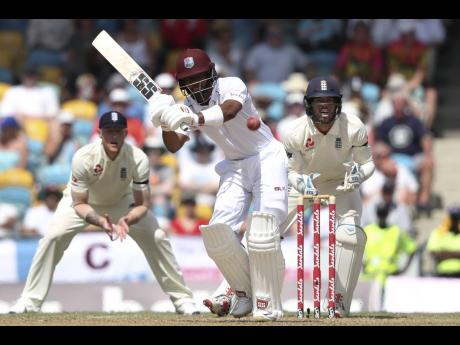Ban on saliva recommended, but sweat allowed to shine ball
DUBAI, United Arab Emirates (CMC):
The ICC’s Cricket Committee has recommended that bowlers be banned from using their saliva to shine the ball, to mitigate the risks posed by COVID-19, but it sees no problem with the use of sweat.
The committee, chaired by former India captain Anil Kumble, also suggested that once play resumes, local umpires should officiate international matches in the short term and there be an increase in reviews through the Decision Review System (DRS) to support that.
The recommendations will be presented to the ICC Chief Executives’ Committee in early June for approval, said a statement from cricket’s world governing body on Monday, after the Cricket Committee held a conference call to specifically address issues related to the COVID-19 pandemic.
“We are living through extraordinary times, and the recommendations the committee have made today are interim measures to enable us to safely resume cricket in a way that preserves the essence of our game while protecting everyone involved,” Kumble said.
The Cricket Committee, a panel dealing with the game’s technical aspects, sought advice from the Chair of the ICC Medical Advisory Committee Dr Peter Harcourt regarding the elevated risk of the transmission of the virus through saliva, and unanimously agreed to recommend that the use of saliva to polish the ball be prohibited.
“The committee also noted the medical advice that it is highly unlikely that the virus can be transmitted through sweat and saw no need to prohibit the use of sweat to polish the ball, while recommending that enhanced hygiene measures are implemented on and around the playing field,” it added.
The recommendation comes on the heels of reports that the ICC was considering allowing the use of foreign substances to shine the ball – which is considered ball tampering under normal circumstances – to reduce the risk of spreading the highly contagious COVID-19. However, the committee’s recommendations did not give any scope for that.
On the issue of using non-neutral umpires and referees for international matches, the committee suggested that the current restrictions on umpire and match referee allotments be eased. Since 2002, there has been a requirement that officials appointed by the ICC for men’s Test, ODI and T20I matches not be from the same country as the participating teams.
However, given the challenges of international travel with borders being closed due to the spread of COVID-19, limited commercial flights and mandatory quarantine periods, the committee recommended that local match officials be appointed in the interim.
“The appointments will continue to be made via the ICC from local Elite and International Panel referees and umpires. Where there are no Elite Panel match officials in the country, the best local International Panel match officials will be appointed.
“The committee also recommended that the use of technology is increased to support the appointments of a wider pool of umpires from around the world, and has proposed an additional DRS review per team per innings is introduced in each format as an interim measure,” the ICC said.
While the COVID-19 pandemic has curtailed cricket, efforts are being made to have the West Indies’ three-Test tour of England come off in early July.
However, South Africa’s five-match T20I and two-Test tour and the New Zealand tour of the West Indies, both due to start in July, are still in jeopardy.

